Improving wild and cultivar blueberries to fight diabetes and cancers (改良野生和栽培蓝莓品种对抗糖尿病和癌症)
Why This Project Is Important
“We are what we eat.” Imbalanced and unhealthy diet is a major reason for various diseases such as diabetes and cancers. Among many approaches we explored so far, a healthy and attractive diet is key to the control and prevention of obesity, type-2 diabetes, as well as cancers. Michigan Technological University (Michigan Tech) is located at the home town and origin of North America blueberries. This project (http://www.superiorideas.org/projects/blueberries-to-fight-diabetes-and-...) will focus on the study of the healthful and highly antioxidant fruit, the blueberry. We will explore the improvements of wild and cultivar blueberries by modulating the fruit size and the fruit contents in antioxidants and flavors.
The objective of this project is to better improve wild and cultivar blueberry species and grow 10 to 40 acres of the improved blueberries for Michigan Tech's Biology students, and faculty members, to access for various healthy-related research. Thus, the proposed research will not only provide better blueberries to fight against diabetes and cancers, but also promote the consumption of blueberries by individuals who will be educated with new discoveries made through this project. This long-term blueberry experimental station will be established for Michigan Tech students, faculty members, as well as local residents.
“我们的健康在于我们所吃的食物”。不平衡和不健康的饮食是各种疾病如糖尿病和癌症的主要原因。在迄今为止探索的许多方法中,健康且具有吸引力的饮食是控制和预防肥胖,2型糖尿病以及癌症的关键。密西根理工大学生物系所在地是北美蓝莓的故乡与发源地之一。该课题重点研究健康的、高度抗氧化能力的水果蓝莓,通过调节蓝莓果实大小和抗氧化物质和风味成份含量来探索野生和栽培蓝莓品种的改良。该项目的目标是更好地改善野生和栽培蓝莓品种,并建立一个10至40英亩的改良蓝莓实验基地,供密西根理工大学生物系学生和教职员工进行各种蓝莓与健康相关的研究,提供更好的蓝莓品种来抗击糖尿病和癌症,用该项目研究成果促进患者和普通民众对蓝莓的消费。为密西根理工大学生物系学生、教职员工和当地居民建立一个长期的蓝莓研究实验站。
Project Description
This project will have the following objectives:
- Establish a long-term blueberry experimental station and make it free access to Michigan Tech students, faculty, and local residents;
- Improve the wild and cultivar blueberry by enlarging the fruit size and enriching the fruit nutritions to fight diabetes and cancers;
- Provide low-cost blueberry plants to local residents to help them grow their economic income.
There are multiple Michigan Tech researchers working on this project. They include a plant biologist, and two diabetes and cancer researchers from the Department of Biological Science. The principal investigator (PI), Guilang Tang, has an active National Science Foundation (NSF) project aiming to improve agricultural crops including rice, maize, soybean, and tomato. Through the NSF project, the PI developed a technology that can enlarge or reduce the tomato fruit size and improve the tomato flavor. This project will aim to translate the technology and lessons learned from the tomato to the blueberry. The two co-investigators working on diabetes and cancers will test the improved blueberry for the effectiveness of diabetic and cancer preventions. In addition, we call for volunteer undergraduate students from Michigan Tech Biology, Business, and Engineering Departments to join in this project for the station setup, collection of wild and cultivar blueberry germplasm, in vitro propagation, and fruit size and content modulation breeding.
We have the following specific goals call for donation:
- 10 to 40 acres of land close to Michigan Tech to set up a long-term blueberry research station. The land could also be a partial or a whole well-established blueberry farm from local regions for a fast establishment in collaboration.
- For a fast establishment, we recruit $30,000 worldwide: $5,000 is for purchasing blueberry plants and the $25,000 for purchasing land.
Donors will be rewarded with one pound of fresh blueberries or one blueberry plant for every dollar they contribute in the future when the experimental station is well established. Contributors outside US can receive the reward whenever they have a chance to visit the well-established station at any time in the future. Donors will have the privilege to monitor the blueberry experimental station for ever.
Contribution in the USA, click http://www.superiorideas.org/fund/189T. Contribution in China contact Wechat (微信): Aaran_yue (合肥工业大学岳博士).
该项目具有以下目标:1.建立一个长期的蓝莓研究实验站,供密西根理工大学生物系学生、教职员工和当地居民免费进入进行研究活动; 2.通过扩大与调节蓝莓果实大小、抗氧化物质和风味成份含量来探索野生和栽培蓝莓品种的改良; 3.向当地居民提供低成本蓝莓种苗,帮助他们增加经济收入。 本项目有多位密西根理工大学生物系学生、教职员工技术人员参与。他们有密西根理工大学生物科学系植物生物学家,糖尿病和癌症研究人员。主要研究成员(PI)具有美国国家自然科学基金(NSF)项目,旨在改善农业作物,包括水稻,玉米,大豆和番茄的产量与品质。通过NSF项目,主要研究成员开发了可以扩大或减小番茄果实大小,提高番茄风味的技术。该项目旨在将这种技术从番茄应用到蓝莓改良上。糖尿病和癌症研究的两名研究人员将测试改良后的蓝莓对糖尿病和癌症预防的有效性。另外,我们将招聘密西根理工大学生物系、商业和医学工程系的志愿本科生参加这个项目,进行蓝莓研究实验站设计、野生和栽培蓝莓种质库的收集、体外繁殖和果实大小及物质风味含量的育种研究。 我们希望获得以下具体捐赠目标:(1)密西根理工大学附近10至40英亩的土地建立一个长期的蓝莓研究站。这片土地可以是当地全新的农地或者与已有的部分或全部蓝莓农场建立合作关系。 (2)为了快速建立该研究基地,我们向全球募捐30,000美元:5000美元用于购买蓝莓种苗,25,000美元用于购买土地。捐赠者每捐一美元将来蓝莓园建成生产之日回报一磅新鲜蓝莓或者一株蓝莓苗!美国以外的捐赠者在未来建成生产期随时访问实验站时会收到回报。捐赠者有权长期监管蓝莓实验站。美国捐赠按:http://www.superiorideas.org/fund/189T。中国捐赠联系微信:Aaran_yue (合肥工业大学岳俊阳博士)
This crowdfunding project is running on website through several major communication APPs: WeChat, Facebook, Twitter, and Linkedin. A statistic analysis for succssful rates in APPs, countries, and finacial conditions will be conducted. The results so far indicate that WeChat is most successful. Among various countries, mainland China is most active, US and African countries follow. 95% donations came from China.
Note: Gifts to projects listed on SUPERIORIDEAS.ORG are received and processed by Michigan Tech Fund. Michigan Tech Fund is a tax-exempt organization under Section 501(c)(3) of the Internal Revenue Code acting on behalf of Michigan Technological University. It is the policy of Michigan Tech Fund that a portion of the gifts and/or income therefrom may be used to defray the costs of raising and administering the funds.
Meet the Researcher

Guiliang Tang
Dr. Tang conducted his graduate research on the catabolic pathway of the essential amino acid lysine in the laboratory of Dr. Gad Galili at the Weizmann Institute of Sciences, Israel. He then moved to the laboratory of Dr. Phillip D. Zamore at the University of Massachusetts Medical School for his post-doctoral research on plant RNA interference (RNAi) and microRNA (miRNA) pathways. He established his independent Gene Suppression Laboratory at the University of Kentucky (UK) and became a tenured Associate Professor there. In October 2011, he moved from UK to Michigan Technological University (MTU) at the Michigan’s Upper Peninsula (U. P.) for a family reunion and enjoyed the first winter time with much outdoor activities with his wife and kids. In May 2016, he became a full professor.
days left
funded
last
What Your Donation Can Help Us Do:
- Purchase 8 to 40 acres of land for the blueberry experimental station
- Purchase blueberry plants
- Your donations after the closing date are still welcome. Please contact gtang1@mtu.edu for further contributions.
Recent Donors
Some donors may be hidden.

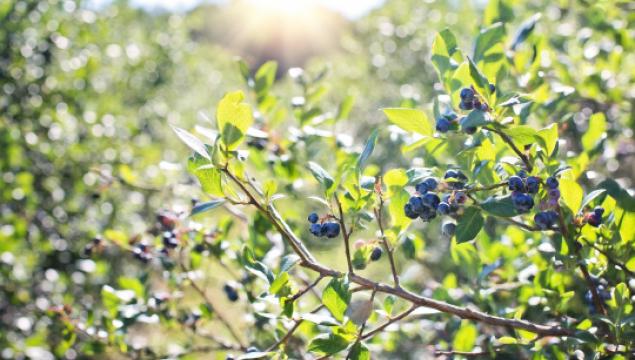
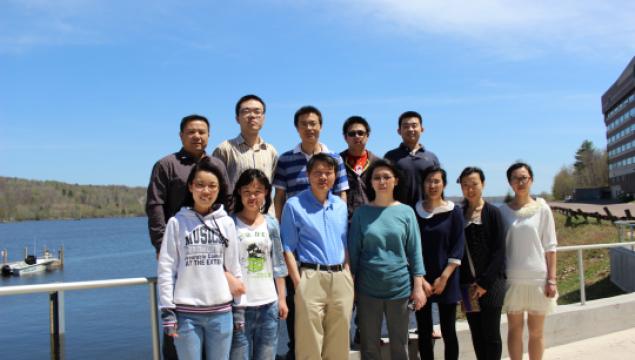

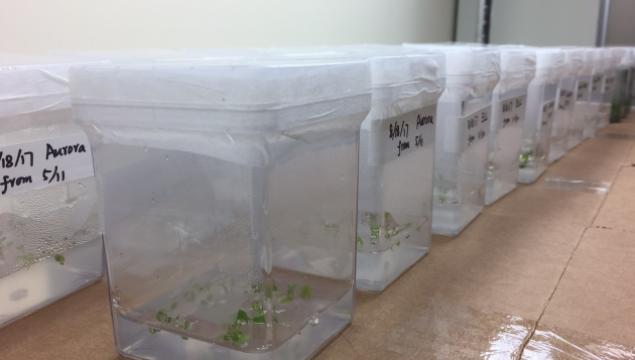
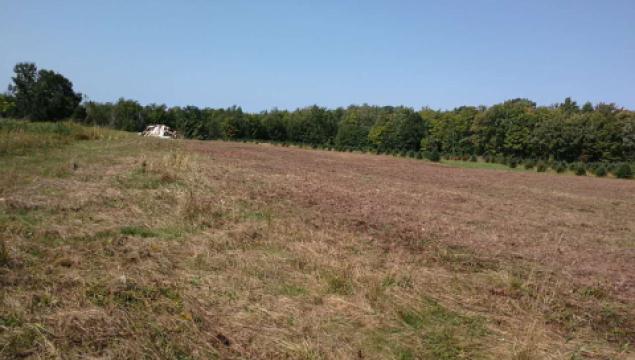
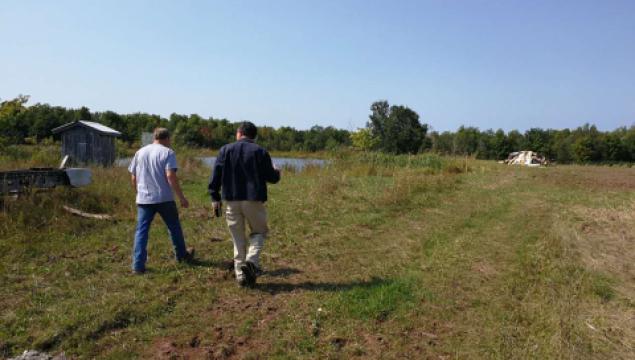
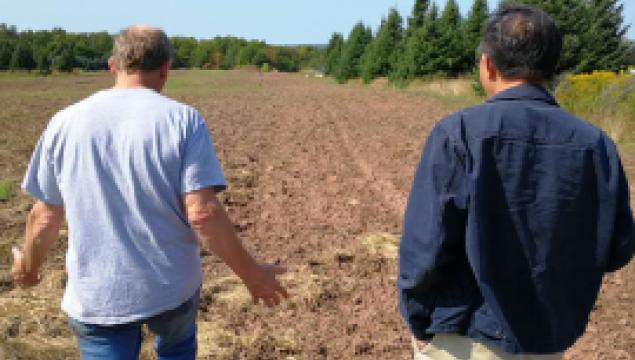
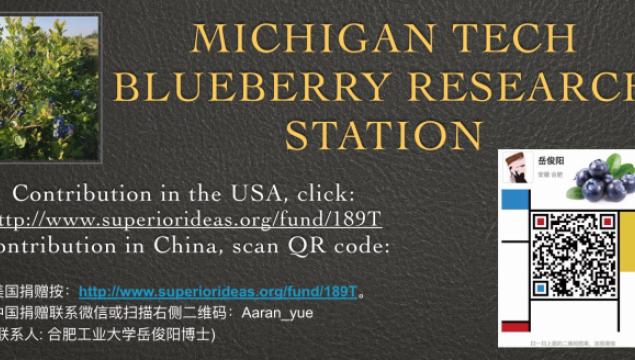
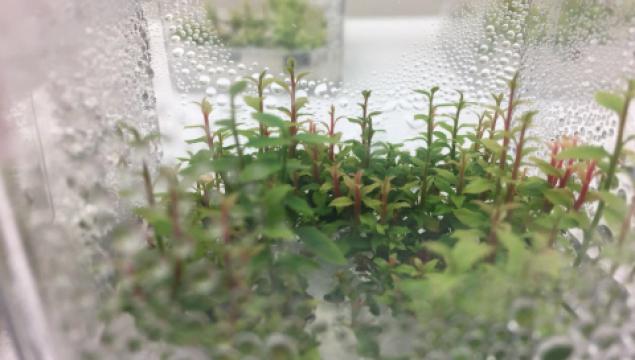
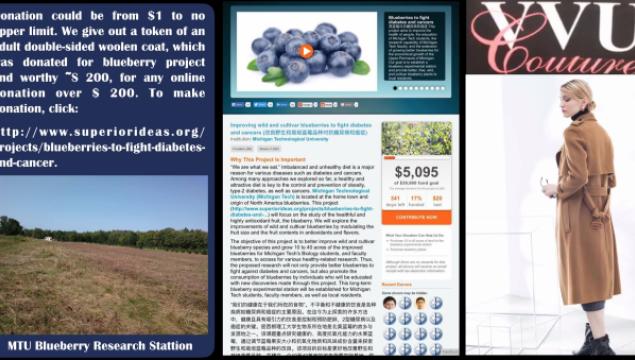
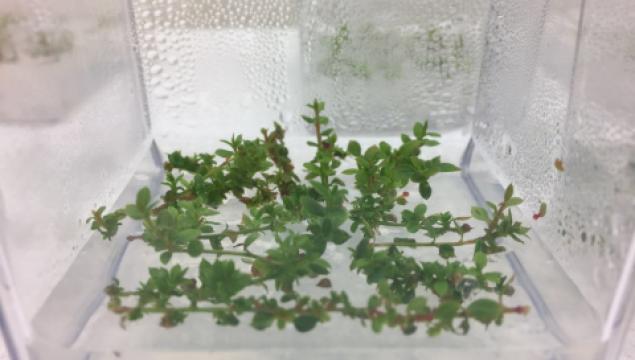
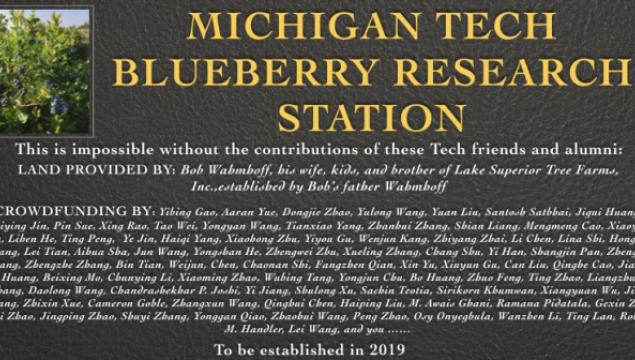


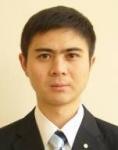

 Gifts to projects listed on SUPERIORIDEAS.ORG are received and processed by Michigan Tech Fund. Michigan Tech Fund is a tax-exempt organization under Section 501(c)(3) of the Internal Revenue Code acting on behalf of Michigan Technological University. It is the policy of Michigan Tech Fund that a portion of the gifts and/or income therefrom may be used to defray the costs of raising and administering the funds.
Gifts to projects listed on SUPERIORIDEAS.ORG are received and processed by Michigan Tech Fund. Michigan Tech Fund is a tax-exempt organization under Section 501(c)(3) of the Internal Revenue Code acting on behalf of Michigan Technological University. It is the policy of Michigan Tech Fund that a portion of the gifts and/or income therefrom may be used to defray the costs of raising and administering the funds.
Questions for the Researcher